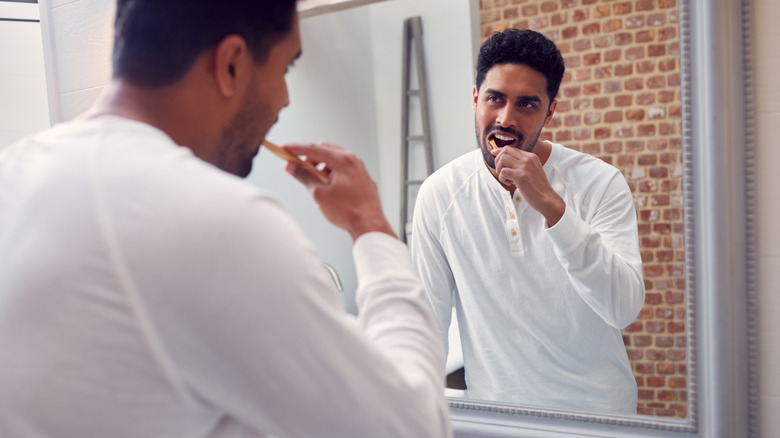Brushing Your Teeth Has A Little-Known Effect On Your Early Death Risk
Following the American Dental Association's (ADA) advice to brush your teeth twice daily may do a whole lot more than prevent tooth cavities and decay; it may prolong your lifespan if you ever find yourself in the hospital. Findings of a 2023 systematic review published in JAMA Internal Medicine suggest that hospitalized patients who practice proper oral hygiene may stand a lower risk of death in the intensive care unit (ICU) than those who forgo toothbrushing.
Researchers examined data from 15 different clinical trials involving more than 2,700 patients. Twice daily toothbrushing was found to be linked with lower rates of hospital-acquired pneumonia (HAP), an infection that can lead to long-term hospitalization, costly medical bills, and an increased risk of death. With estimates of anywhere between five to over 20 HAP cases per every 1,000 hospital admissions (via BMC Pulmonary Medicine), risk reduction proved significant among patients on mechanical ventilators. In fact, patients in the ICU who brushed their teeth got off ventilators faster, spent less time in the ICU, and had lower death rates.
The link between toothbrushing and lower death risk in ICU
With more than 700 different strains of bacteria found in the mouth, brushing our teeth keeps this balance of bacteria in check (via Geisinger Health). When we neglect our oral hygiene, however, bacteria are left to thrive. Breathing these potentially harmful germs into our lungs subsequently increases our risk of infection, including pneumonia. "Research has shown that improving oral hygiene among hospital patients reduced cases of hospital-acquired pneumonia by 40%," says pediatric dentist Dr. Natalie Stinton, who was not involved in the 2023 review, told Geisinger Health. Findings from an alternate 2022 study published in the American Journal of Infection Control reports that death occurs in approximately 8% of HAP patients. By being vigilant about brushing our teeth, we may better protect ourselves against mortality from HAP.
But reducing our susceptibility to hospital-acquired pneumonia isn't the only way in which brushing our teeth may lower our risk of mortality. Researchers from a 2008 study published in The Journals of Gerontology looked at the relationship between how many teeth a person has and their risk of mortality along with certain, specific health conditions. The findings showed a link between a reduced number of healthy teeth and early death risk. The researchers concluded that practicing proper oral hygiene (which included teeth brushing) may benefit one's health and keep mortality at bay.
Tips for brushing your teeth
Of course, we want to get the most out of brushing our teeth in order to stave off tooth decay, staining, and gum disease. In addition to protecting against mortality, brushing our teeth twice a day may also help prevent dementia, kidney issues, and some cancers (via Fortson Dentistry). We're sold! Yet 2024 survey data from OnePoll (rebranding to Talker Research) conducted on behalf of LISTERINE® Clinical Solutions revealed that teeth brushing slips the minds of people in the U.S. as many as five times a week.
If you're among the 55% of Americans who reported being dedicated twice-daily brushers, here's how to ensure your chompers are getting the cleanest of cleans. First, make sure you have the right equipment. In addition to using a soft-bristled toothbrush, the American Dental Association (ADA) recommends fluoride toothpaste to prevent cavities and demineralization. Position your toothbrush at an angle along the gumline and brush side to side using short motions. To get behind those front teeth, hold your toothbrush upright and repeatedly brush up and down. By tending to our oral health for 2 minutes twice a day every day, we can show off our sparkling smile for years to come. Just remember to go gentle on the little guys — you don't want to brush your teeth too harshly.


